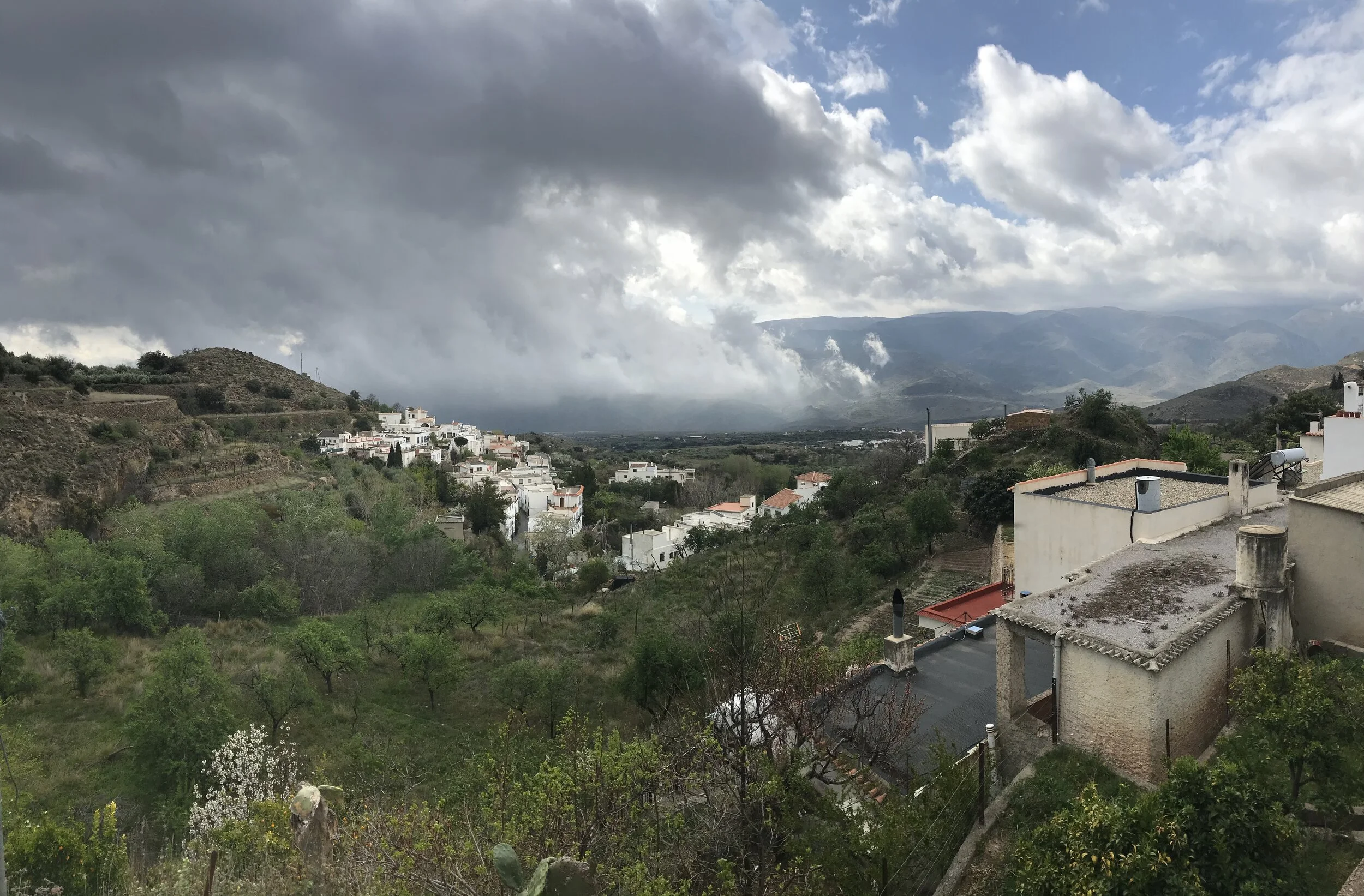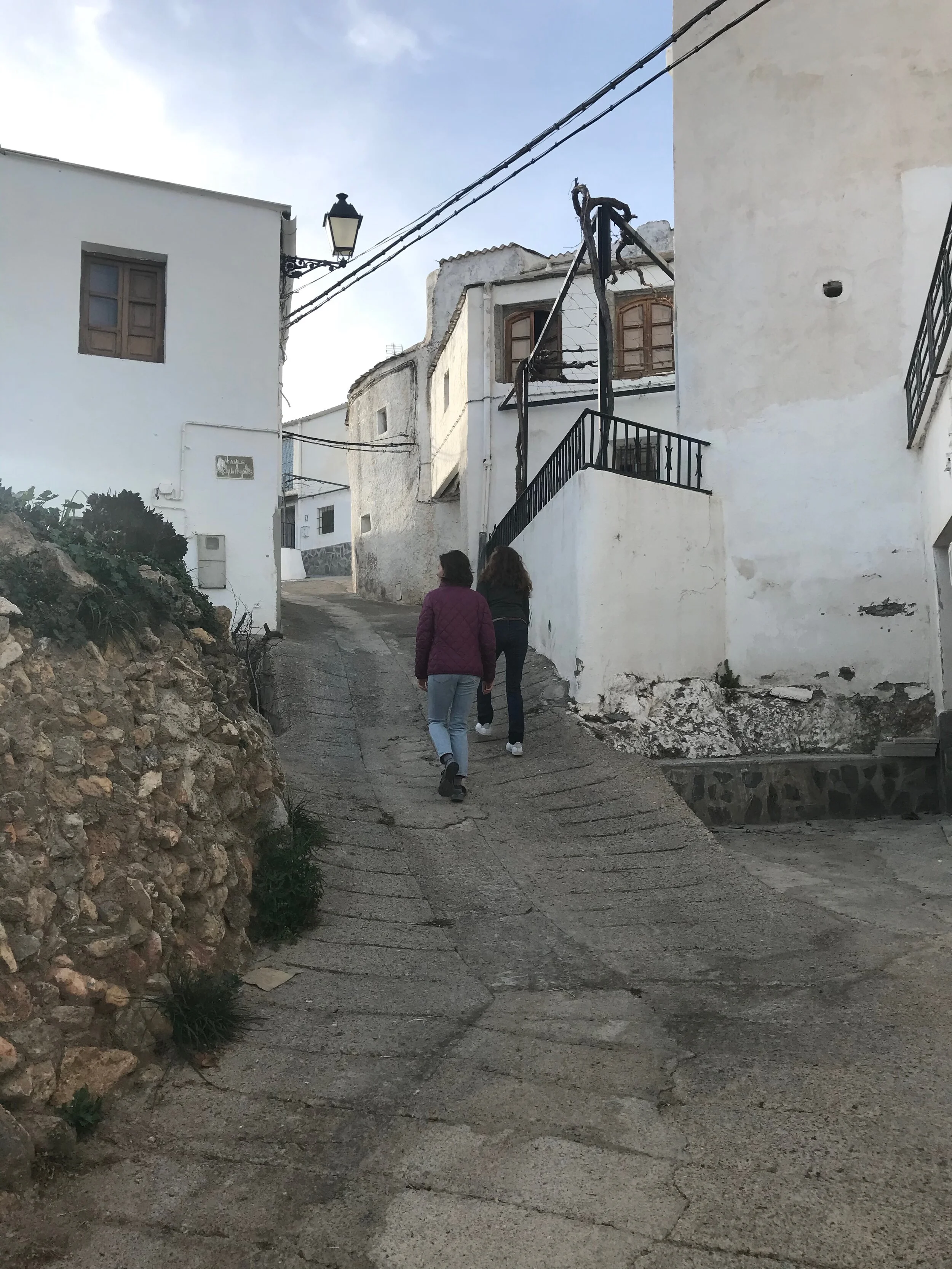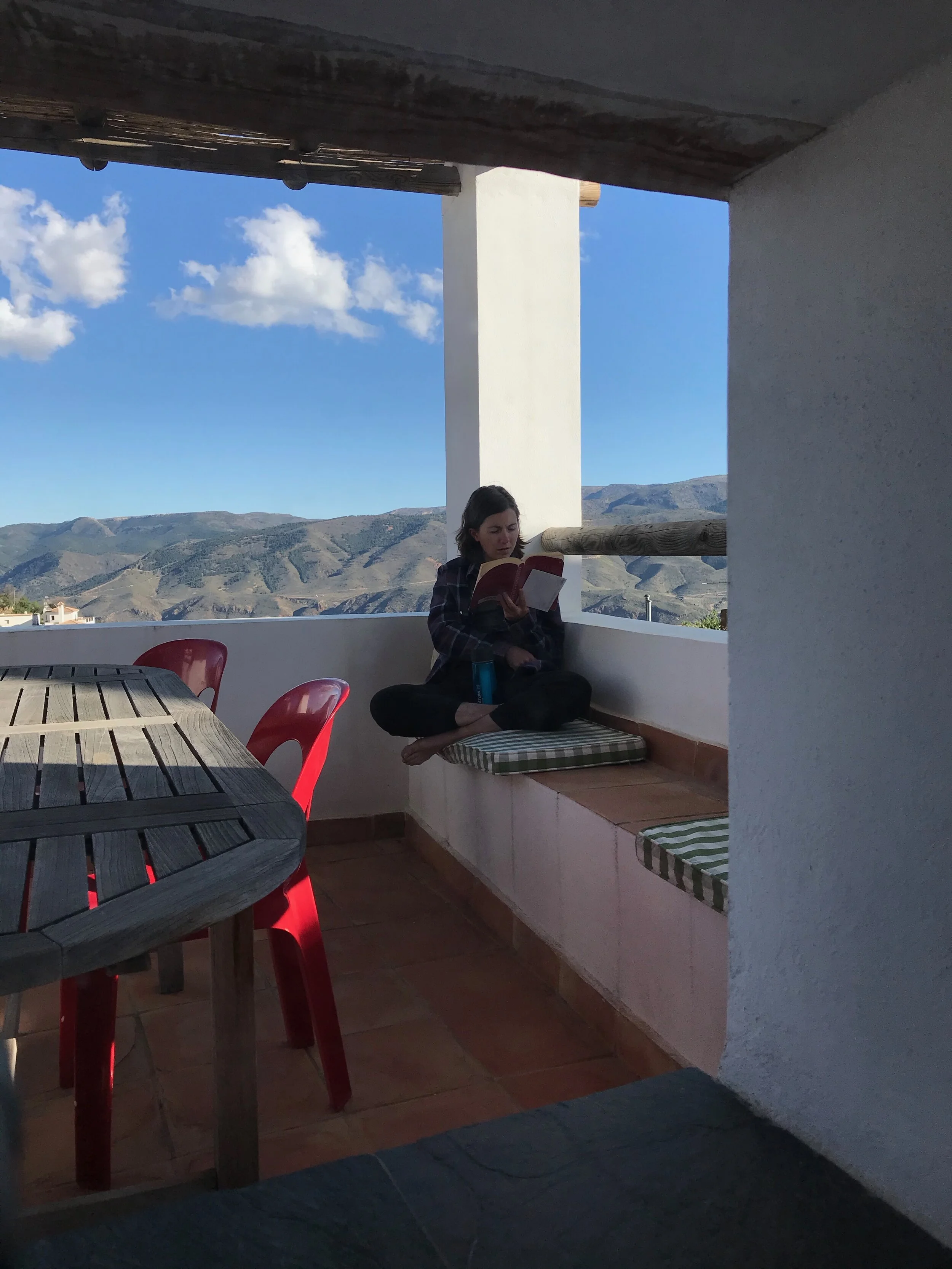Silence in Spain
Clouds Over Beires
We awoke early this past Sunday to cascades of grey clouds spilling over the mountains in Aragon. They covered the valley before us like a down comforter, darkening the grape fields and stone farmhouses by shades. We silently packed and performed some last rituals in the greenhouse while trying to ignore our turning stomachs and the tightness in our chests - a mix of the morning’s coffee kicking in and a nervous apprehension about our day’s plans. We were leaving a week earlier than we’d intended, the hotel we were working at closed by governmental mandate. After our last goodbyes to garden and kitchen crew, we piled into the van, hopeful to get back down to Jodi and The Molino in Andalucía within the day, before the rumored regional border blockades and forced vehicle stoppages were put into effect. Coronavirus has found Spain.
Saturday, the previous afternoon, almost exactly two days after I posted about the importance of communal gathering and shared meals here, the Prime Minister of Spain announced voluntary quarantine measures and called for the closure of all non-essential businesses for at least 14 days. The evening before, Catalunya, the region directly to our east, had suggested that it might close its borders to all traffic by air, boat, or train in an attempt to halt the viruses push east from Madrid. Streets went quiet for the first time since we’ve arrived, restaurants barred and bars unlit, neighbors’ windows and doors closed tight to each other and the world.
The brooding weather followed us Sunday on our mad dash south by van, train, and car, through four regions and across four borders, including Cataluña’s twice. From Tortossa to Almería, everything had stopped: the lone car on the drive to catch our train, we held our breath as Catalan began to mirror Castellano in the signage on the sides of the road (Valderrobres/Vall-de-roures, Cretes/Queretas), an indication we were approaching the mountain pass border into Cataluña. Luckily for us, the rumors of increased security proved to be false (or maybe were only a couple days delayed) and we passed freely to our station. There, the wide, terrified eyes of the few other displaced travelers stared at us above paper masks and scarves. The ordinarily boisterous Spanish, wildly gesticulating to their fellow commuter sat still, silent, and apart from one another. The conductor allowed us through without checking our tickets, “because so few are traveling today,” he said. I suspect, too, so that he didn’t have to touch our papers.
Valencia was a ghost town. What few travelers there were seemed to float aimlessly between platforms and stations, desperate to get home, to not be in public, terrified to get stuck here should truly everything close down. Outside the station, a line of cabs, like a last-minute calvary call, awaited non-existent fares. Banks and bus lines were closed. Some markets and pharmacies too, though they were supposed to be open, the only businesses designated as “essential.”
We arrived at the car rental office and the door was locked. My heart dropped. We’d reserved online, but with banks, pharmacies, and buses closing, and so few traveling, it seemed plausible that rental car offices would close too. We waited a couple minutes, hopeful that the agent had just gone to the lot to help another customer, hopeful that the car company, in order to make a quick buck, would overlook the seemingly tailor-made efficiency of their model to spread a virus in a pandemic. Still, no one came. We were beginning to panic, not sure how we would otherwise make it out of Spain’s third largest city and down to Jodi and relative isolation. We tried the door one last time. Still locked, of course, but as I rattled the handle my eyes lighted on something. I don’t know how we missed it before, but there, right at eye-level was a hand written sign informing us that the agent, due to high demand, would meet customers directly in the lot. Finally, minutes later, as we sat in our newly acquired Toyota Aygo eating the sandwiches we’d hastily packed earlier that morning (sandwiches which tasted vaguely of hand sanitizer), I could breathe.
About three hours into our drive we decided to stop for a coffee and the bathroom. Gas stations were meant to be open still, but we pulled off four times before finding one that was. Partially. Grates were pulled across the doors preventing actual entry. Cash and card were slid through an improvised drive-thru window to the gloved attendant locked inside in exchange for road snacks, lotto tickets, cigarettes, or whatever it is you might need to survive the apocalypse. We found coffee at a Nespresso vending machine around the corner but no available bathroom. Cafe con leche in hand, we filled our tank and pushed on.
Beires
When we arrived in Beires early that evening, the setting sun and coming storm front combined to cast a blue haze across the village. Usually on a Sunday, the shouts of pick up soccer, the click-clack of dominoes, and Spanish radio bounce around the narrow alleys between homes and echo across the valley. Tonight, only the occasional bird song. Doesn’t she know the world is ending? As we stepped out of our car it felt eerily like stepping onto one of the many abandoned Spaghetti Western sets strewn throughout the Andalusían desert. Nervous neighbors - some whom we’d met just weeks ago - peered out of windows and around corners as we, strangers now, unpacked the car. Without talking, we hauled our bags up the sloped, nearly vertical, concrete pathways, to the top of the village and into the Casa de Gatos, The Cat House, where we would be staying for the foreseeable future.
The blue silence and our weariness from travel made it feel much later than it actually was. We slept.
We awoke yesterday to the same low clouds crawling through the valley beneath our perch at the top of the village. In order to get some internet, we walked down the hill toward Lola’s hotel and bar. The quiet of the world around us, the absence of other life in these streets, made space for my paranoid mind to wander: Was this claustrophobic shadow to be the new normal; a world of sun and citrus turned shades of grey?
As if in answer to my question, we rounded the corner and saw Paco’s wife, dressed in the usual smart way of the older generation of Spanish, green skirt suit, hair permed, and carrying a watering can. We hesitated, unsure about how new international (and intergenerational) friendships might survive in a country under quarantine.
She looked up and a wave of recognition crossed her face, followed by a smile. She gripped the can more tightly, struggling against the new apocalyptic rules not to embrace us in Spanish welcome. “Buenas! Que tal,” we asked, how are you in these “tiempos locos.”
We smiled and nodded at her excited response, picking up only bits and pieces: Things are the same here, as ever, though a bit scary…It’s good to see you…We’re glad you’re back. This is a good place to be right now.
By the afternoon, the southern sun had burned off the clouds and light streamed into the village. At least here in Beires, for now, not everything has changed.



